Arts & Entertainment
Summer film and TV preview
The LGBTQ productions that will take you to the ‘Heights’
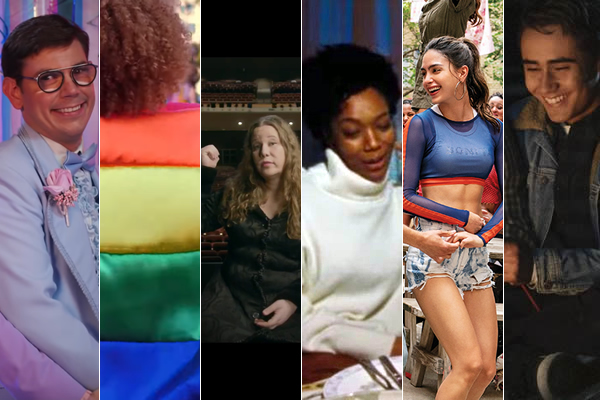
Summer is coming, once again, and this time it feels like a pretty big deal. For the first time in more than a year, we can look forward (fingers crossed) to a return to semi-normalcy, and it’s reasonable to make plans for enjoying at least some of our time outside the socially distanced safety of our living rooms.
That said, the waning of COVID also means that the television and film industry has an embarrassment of accumulated riches ready to offer us – and even if we have binge-watched our way through the past 14 months, we say, “Bring it on!”
There’s so much queer-flavored entertainment on deck in the coming few weeks that it can be a bewildering task to keep track of it all. Fortunately, the Blade is here to help, with our list of the movies and shows that seem likely to represent the cream of the crop.
First, the television:
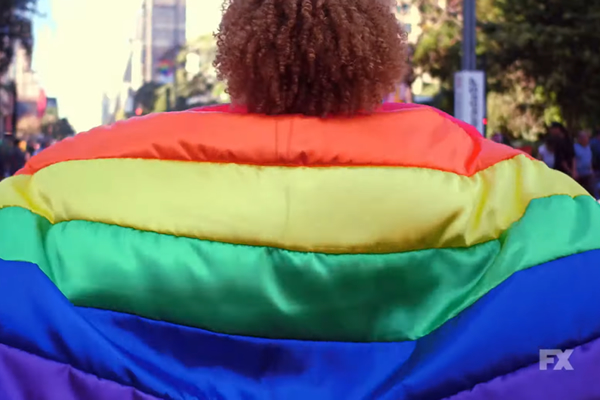
A scene from ‘PRIDE.’ (Screen capture via YouTube)
PRIDE (May 14, FX)
This six-part documentary series from VICE studios may have already started, but it’s a great kick off to Pride Season – and thanks to “FX on Hulu,” it’s easy to catch up at your leisure. Chronicling the struggle for LGBTQ+ civil rights in America from the 1950s through the 2000s, seven renowned LGBTQ+ directors explore stories of queer experience, from the FBI surveillance of homosexuals during the 1950s “Lavender Scare” to the “Culture Wars” of the 1990s and beyond, exploring the queer legacy of the Civil Rights movement and the battle over marriage equality. Offering profiles of familiar heroes like Bayard Rustin and Christine Jorgensen, as well as of lesser-known figures like Madeleine Tress and Nelson Sullivan, the show charts the evolution of LGBTQ+ rights and identities through interviews and archival footage to provide a valuable perspective on queer history, just in time for Pride month.
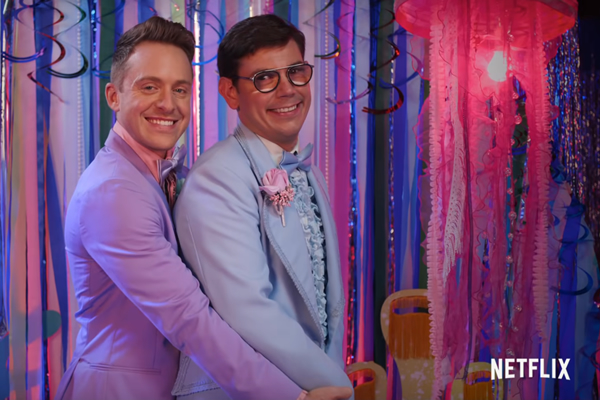
Max Jenkins and Ryan O’Connell in ‘Special.’ (Photo courtesy Netflix)
SPECIAL (May 20, Netflix)
Freshly dropped is the second and final season of this surprise hit series from Ryan O’Connell, a semi-autobiographical comedy about a writer with cerebral palsy (played by O’Connell himself) trying to navigate life in the Los Angeles “scene” as a gay man with a disability. The abbreviated (only four episodes) final arc follows Ryan as he tries to “get his shit together” after the disastrous events of season one – including a fight with his mother Karen (Jessica Hecht) that has left them estranged ever since – that have left him with a nasty case of writer’s block. New relationships are also on the horizon for both Ryan and BFF Kim (Punam Patel), and the journey toward self-discovery and self-actualization takes center stage as this disarmingly charming and refreshingly unsentimental comedy – currently the only show on television to feature a disabled LGBTQ person as its main character – comes to a close. Max Jenkins, Charlie Barnett, Ana Ortiz, Utkarsh Ambudkar, Lauren Weedman, and Leslie Jordan are among those joining the show for season two, alongside returning cast members Marla Mindelle, Gina Hughes, and Patrick Fabian.
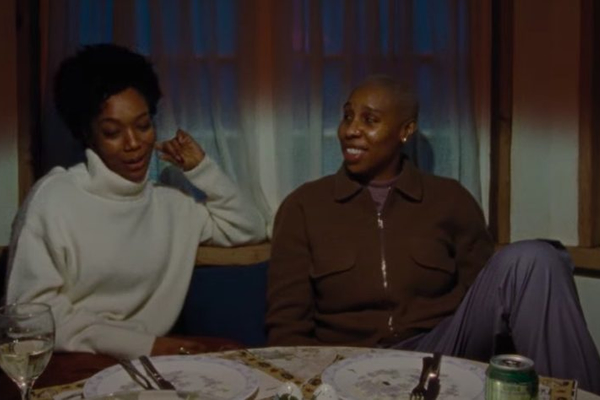
Naomi Ackie and Lena Waithe in ‘Master of None.’ (Photo courtesy Netflix)
MASTER OF NONE (May 23, Netflix)
Returning for a much-anticipated season 3 is this acclaimed series, co-created by Aziz Ansari and Emmy-winner Alan Yang. Always strongly “queer-adjacent” thanks largely to the involvement of Lena Waithe, who played the lesbian character of Denise throughout the first two seasons and became the first Black woman to win a writing Emmy for the episode “Thanksgiving,” based partly on her own experience coming out to her mother. In its third installment, the show takes a radical departure from following Ansari’s lead character (struggling actor Dev Shah) and instead focuses all of its five-episode run on the relationship between Denise and partner Alicia (played by BAFTA-winner Naomi Ackie).
Directed by Ansari, who also co-wrote with Waithe, this new season touts itself as “a modern love story that intimately illustrates the ups and downs of marriage, struggles with fertility, and personal growth both together and apart.” Judging from its past excellence, this new installment is likely to be one of the summer’s best bets.
BALLERINA BOYS (June 4, PBS)
“American Masters” presents a portrait of Les Ballets Trockadero de Monte Carlo (“The Trocks”), an all-male ballet company that has captivated audiences for over 45 years with their signature style – classical ballet en pointe and in drag, delivered with a blend of rigorous technique and satire that challenges the rigid gender norms of the art form – while also delivering a message of equality, inclusion and social justice. This profile from director Chana Gazit follows the legendary troupe as they tour the Carolinas, and culminates with their 2019 performance at the Stonewall 50th anniversary concert in NYC. The hour-long doc broadcasts on June 4 (check your local listings), but it will also be available via the PBS video app in honor of Pride Month.
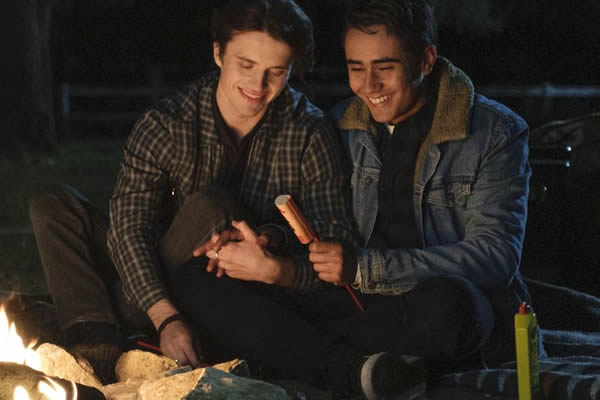
George Sear and Michael Cimino in ‘Love, Victor.’ (Photo courtesy of Hulu)
LOVE, VICTOR (June 11, Hulu)
The popular teen dramedy, inspired by the hit LGBTQ teen romance “Love, Simon,” returns for season two as the newly out Victor (Michael Cimino) enters his junior year at Creekwood High. As his story continues, Victor faces challenges such as a family struggling with his revelation, his heartbroken ex-girlfriend Mia (Rachel Hilson), and the difficulties of being an openly gay star athlete – all while navigating the excitement of his relationship with new boyfriend Benji (George Sear). Odds are good that this continuation will deliver more of the same blend of heart, humor, and diversity that helped the first season become one of last summer’s must-see highlights. Anthony Turpel, Bebe Wood, Mason Gooding, Isabella Ferreira, Mateo Fernandez, James Martinez, and Ana Ortiz also star.
REUNION ROAD TRIP: QUEER EYE FOR THE STRAIGHT GUY (June 17, E! Entertainment)
As part of the network’s special event series, “Reunion Road Trip,” the original “Fab Five” – Thom Filicia, Ted Allen, Kyan Douglas, Carson Kressley and Jai Rodriguez – reassemble in Los Angeles to do a makeover for Jai on his 40th birthday. As the group works their magic, they think back to their most heartfelt, meaningful makeovers and the impact on the LGBTQ community then and now, delivering a satisfying (and long overdue) trip down memory lane for fans of one of the most important and influential queer shows in television history. Airs at 9pm PT/ET.
Now for the movies:
PINK – ALL I KNOW SO FAR (May 21, Amazon Prime)
Amazon Studios launches its summer with this intimate documentary about award-winning performer and musician Pink as she embarks on her record-breaking 2019 “Beautiful Trauma” world tour and welcomes audiences to join her chosen family while trying to balance being a mom, a wife, a boss, and a performer. Directed by Michael Gracey (“The Greatest Showman”), this look into the private and public sides of a trailblazing artist – who is also a fierce and vocal advocate for the LGBTQ community, where she has long been a fan favorite – mixes footage from the road with behind-the-scenes interviews and personal material, giving audiences a glimpse behind the curtain of “the circus that she calls life.”
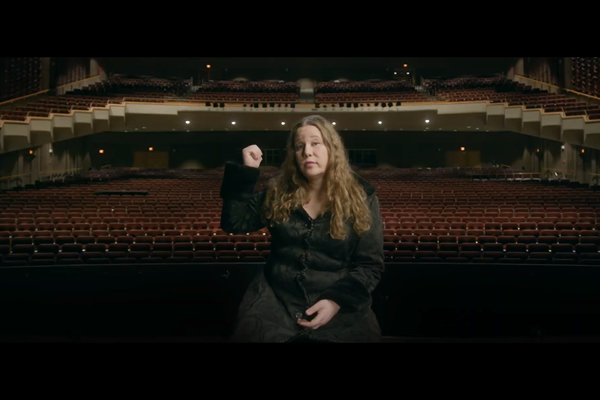
Lucia Lucas in ‘The Sound of Identity.’ (Screen capture via YouTube)
THE SOUND OF IDENTITY (June 1, VOD)
This award-winning documentary from director James Kicklighter profiles international opera star Lucia Lucas as she becomes the first known transgender woman in opera history to perform a principal role. Capturing Lucas on the cusp of international stardom as she prepares for her historic performance at the Tulsa Opera, it showcases the collaborative process between Lucas and her mentor (renowned composer Tobias Picker), as they bring Mozart’s “Don Giovanni” to life – with Lucas, a world-renowned baritone, taking the spotlight and all the pressures that come with it. Along the way, Lucas provides fresh insights into her transition, the professional risk she is taking, and what it means for those who follow. A must-see exploration of the role played by identity in our personal and professional lives, as well as a portrait of an artist at the height of her career.
JULIA SCOTTI: FUNNY THAT WAY (June 1, VOD)
Another documentary profile of a pioneering trans artist, this Susan Sandler-directed film takes audiences on an entertaining but emotional roller coaster as it follows the comeback of Julia Scotti – formerly Rick Scotti, who appeared on bills with Jerry Seinfeld and Chris Rock – after her transition during “a time when the words gender dysphoria and gender reassignment surgery were rarely heard.” Shot over a period of five years, this inspirational doc tracks Julia’s triumphant comeback, the rough life on the road, and the complex process of reuniting with her children, as her comedy becomes a shared language of identity, healing, and joy.

John Benjamin Hickey in ‘Sublet.’ (Screen capture via YouTube)
SUBLET (June 11, VOD)
Fans of steamy international LGBTQ cinema can look forward to this film from Israeli director Eytan Fox, whose haunting gay military romance “Yossi & Jagger” broke ground in expanding support for LGBTQ movies in Israel when it was released in 2002. In his latest offering, 50-something American writer Michael (John Benjamin Hickey) travels to Tel Aviv on assignment, where he sublets an apartment from local student – and sexual free spirit – Tomer (Niv Nissim). The young man quickly becomes his tour guide, and as the two spend time together, they soon find themselves exploring more than just the city – despite the clash of generational attitudes between them. Slated to debut at the cancelled-due-to-COVID 2020 Tribeca Film Festival, it’s getting the release it deserves, as a reminder that Pride stretches across all borders.
RITA MORENO: JUST A GIRL WHO DECIDED TO GO FOR IT (June 18, in Theaters)
Directed by Mariem Pérez Riera, this documentary profiles its EGOT-winning subject with a look at her 70+ year career, following the beloved performer from her poverty-stricken youth in Puerto Rico, through her time as an all-purpose “ethnic stock player” in Hollywood (even after the triumph of becoming the first Latina actress to win an Oscar for her role in “West Side Story”), and her eventual rise to the iconic status she enjoys today. It also chronicles not only Hollywood’s not-so-hidden history of racism, sexism, and abuse, but Moreno’s personal struggles – including a toxic relationship with Marlon Brando and her own bout with serious depression – before her talent and resilience allowed her to triumph over adversity, break barriers, and forge a path for new generations of artists to come. The film features extensive interviews with Moreno, as well as George Chakiris, Héctor Elizondo, Gloria Estefan, Tom Fontana, Morgan Freeman, Mitzi Gaynor, Whoopi Goldberg, Norman Lear, Eva Longoria, Justina Machado, Terrence McNally, Lin-Manuel Miranda and Karen Olivo.

Anthony Ramos and Melissa Barrera in ‘In the Heights.’ (Photo courtesy Warner Brothers Pictures)
IN THE HEIGHTS (June 18, HBO Max and in Theaters)
Make no mistake, the long-awaited film adaptation of the 2005 Broadway musical by Lin-Manuel “Hamilton” Miranda and Quiara Alegria Hughes is sure to be the big-ticket movie of the summer. With charismatic bodega-owner Usnavi (Anthony Ramos) at its center, this sweeping musical portrait of Manhattan’s Washington Heights – a neighborhood mostly populated by immigrant people of color and their families – showcases a remarkable and diverse cast that also includes Corey Hawkins, Leslie Grace, Melissa Barrera, Daphne Rubin-Vega, Stephanie Beatriz, Gregory Diaz IV, Dascha Polanco, Jimmy Smits, Marc Anthony, and Olga Merediz reprising her Broadway role.
The show was a Tony-winning smash onstage for its infectious celebration of community, as well as its uplifting message of following your dreams in the face of adversity. On film, as helmed by “Crazy Rich Asians” director Jon M. Chu, it’s a return to triumphant form for the Hollywood musical, executed with breathtaking cinematic vision and a healthy dose of “magical realism” that does nothing to undercut its streetwise swagger – and it’s probably something you should plan to see on the big screen.
After so many months of isolation, you deserve a special treat.
Theater
Magic is happening for Round House’s out stage manager
Carrie Edick talks long hours, intricacies of ‘Nothing Up My Sleeve’

‘Nothing Up My Sleeve’
Through March 15
Round House Theatre
4545 East-West Highway
Bethesda, Md. 20814
Tickets start at $50
Roundhousetheatre.org
Magic is happening for out stage manager Carrie Edick.
Working on Round House Theatre’s production of “Nothing Up My Sleeve,” Edick quickly learned the ways of magicians, their tricks, and all about the code of honor among those who are privy to their secrets.
The trick-filled, one-man show starring master illusionist Dendy and staged by celebrated director Aaron Posner, is part exciting magic act and part deeply personal journey. The new work promises “captivating storytelling, audience interaction, jaw-dropping tricks, and mind-bending surprises.”
Early in rehearsals, there was talk of signing a non-disclosure agreement (NDA) for production assistants. It didn’t happen, and it wasn’t necessary, explains Edick, 26. “By not having an NDA, Dendy shows a lot of trust in us, and that makes me want to keep the secrets even more.
“Magic is Dendy’s livelihood. He’s sharing a lot and trusting a lot; in return we do the best we can to support him and a large part of that includes keeping his secrets.”
As a production assistant (think assistant stage manager), Edick strives to make things move as smoothly as possible. While she acknowledges perfection is impossible and theater is about storytelling, her pursuit of exactness involves countless checklists and triple checks, again and again. Six day weeks and long hours are common. Stage managers are the first to arrive and last to leave.
This season has been a lot about learning, adds Edick. With “The Inheritance” at Round House (a 22-week long contract), she learned how to do a show in rep which meant changing from Part One to Part Two very quickly; “In Clay” at Signature Theatre introduced her to pottery; and now with “Nothing Up My Sleeve,” she’s undergoing a crash course in magic.
She compares her career to a never-ending education: “Stage managers possess a broad skillset and that makes us that much more malleable and ready to attack the next project. With some productions it hurts my heart a little bit to let it go, but usually I’m ready for something new.”
For Edick, theater is community. (Growing up in Maryland, she was a shy kid whose parents signed her up for theater classes.) Now that community is the DMV theater scene and she considers Round House her artistic home. It’s where she works in different capacities, and it’s the venue in which she and actor/playwright Olivia Luzquinos chose to be married in 2024.
Edick came out in middle school around the time of her bat mitzvah. It’s also around the same time she began stage managing. Throughout high school she was the resident stage manager for student productions, and also successfully participated in county and statewide stage management competitions which led to a scholarship at the University of Maryland, Baltimore County (UMBC) where she focused on technical theater studies.
Edick has always been clear about what she wants. At an early age she mapped out a theater trajectory. Her first professional gig was “Tuesdays with Morrie” at Theatre J in 2021. She’s worked consistently ever since.
Stage managing pays the bills but her resume also includes directing and intimacy choreography (a creative and technical process for creating physical and emotional intimacy on stage). She names Pulitzer Prize winning lesbian playwright Paula Vogel among her favorite artists, and places intimacy choreographing Vogel’s “How I learned to Drive” high on the artistic bucket list.
“To me that play is heightened art that has to do with a lot of triggering content that can be made very beautiful while being built to make you feel uncomfortable; it’s what I love about theater.”
For now, “Nothing Up My Sleeve” keeps Edick more than busy: “For one magic trick, we have to set up 100 needles.”
Ultimately, she says “For stage managers, the show should stay the same each night. What changes are audiences and the energy they bring.”

Friday, February 13
Center Aging Monthly Luncheon With Yoga will be at noon at the DC Center for the LGBT Community. Email Mac at [email protected] if you require ASL interpreter assistance, have any dietary restrictions, or questions about this event.
Go Gay DC will host “LGBTQ+ Community Happy Hour Meetup” at 7 p.m. at Freddie’s Beach Bar and Restaurant. This is a chance to relax, make new friends, and enjoy happy hour specials at this classic retro venue. Attendance is free and more details are available on Eventbrite.
Women in their Twenties and Thirties will be at 7 p.m. on Zoom. This is a social discussion group for queer women in the D.C. area. For more details, visit the group on Facebook.
Saturday, February 14
Go Gay DC will host “LGBTQ+ Community Brunch” at 11 a.m. at Freddie’s Beach Bar & Restaurant. This fun weekly event brings the DMV area LGBTQ community, including allies, together for delicious food and conversation. Attendance is free and more details are available on Eventbrite.
The DC Center for the LGBT Community will host a screening of “Love and Pride” at 1:30 p.m. This event is a joy-filled global streaming celebration honoring queer courage, Pride, and the power of love. It’s a bold celebration of courage and community — a fearless reminder of what we’ve overcome, how love is what makes us unstoppable, and how we have always turned fear into fierce. For more details, visit the Center’s website.
Sunday, February 15
LGBTQ+ Community Coffee and Conversation will be at 12 p.m. at As You Are. This event is for people looking to make more friends and meaningful connections in the LGBTQ community. Attendance is free and more details are available on Eventbrite.
Monday, February 16
Queer Book Club will be at 7:00p.m. on Zoom. This month’s read is “Faebound” by Saara El-Arifi. For more details, visit the DC Center’s website.
“Center Aging: Monday Coffee Klatch” will be at 10 a.m. on Zoom. This is a social hour for older LGBTQ+ adults. Guests are encouraged to bring a beverage of choice. For more information, contact Adam ([email protected]).
Tuesday, February 17
Center Bi+ Roundtable will be at 7 p.m. on Zoom. This is an opportunity for people to gather in order to discuss issues related to bisexuality or as Bi individuals in a private setting.Visit Facebook or Meetup for more information.
Wednesday, February 18
Job Club will be at 6 p.m. on Zoom upon request. This is a weekly job support program to help job entrants and seekers, including the long-term unemployed, improve self-confidence, motivation, resilience and productivity for effective job searches and networking — allowing participants to move away from being merely “applicants” toward being “candidates.” For more information, email [email protected] or visit thedccenter.org/careers.
Thursday, February 19
The DC Center’s Fresh Produce Program will be held all day at the DC Center for the LGBT Community. To be fair with who is receiving boxes, the program is moving to a lottery system. People will be informed on Wednesday at 5 p.m. if they are picked to receive a produce box. No proof of residency or income is required. For more information, email [email protected] or call 202-682-2245.
Virtual Yoga Class will be at 7 p.m. on Zoom. This free weekly class is a combination of yoga, breath work and meditation that allows LGBTQ+ community members to continue their healing journey with somatic and mindfulness practices. For more details, visit the DC Center’s website.
Movies
As Oscars approach, it’s time to embrace ‘KPop Demon Hunters’
If you’ve resisted it, now’s the time to give in

If you’re one of the 500 million people who made “KPop Demon Hunters” into the most-watched original Netflix title in the streaming platform’s history, this article isn’t for you.
If, however, you’re one of the millions who skipped the party when the Maggie Kang-created animated musical fantasy debuted last summer, you might be wondering why this particular piece of pop youth culture is riding high in an awards season that seems all but certain to end with it winning an Oscar or two; and if that’s the case, by all means, keep reading.
We get it. If you’re not a young teen (or you don’t have one), it might have escaped your radar. If you don’t like KPop, or the fantasy genre just isn’t your thing, there would be no reason for that title to pique your interest – on the contrary, you would assume it’s just a movie that wasn’t made for you and leave it at that.
It’s now more than half a year later, though, and “KPop Demon Hunters” has yet to fade into pop culture memory, in spite of the “new, now, next” pace with which our social media world keeps scrolling by. It might feel like there’s been a resurgence of interest since the film’s ongoing sweep of major awards in the Best Animated Film and Best Song categories has led it close to Oscar gold, but in reality, the interest never really flagged. Millions of fans were still streaming the soundtrack album on a loop, all along.
It wasn’t just the music that they embraced, though that was definitely a big factor – after all, the film’s signature song, “Golden,” has now landed a Grammy to display alongside all of its film industry accolades. But Kang’s anime-influenced urban fantasy taps into something more substantial than the catchiness of its songs; through the filter of her experience as a South Korean immigrant growing up in Canada, she draws on the traditions and mythology of her native culture while blending them seamlessly into an infectiously contemporary and decidedly Western-flavored “girl power” adventure about an internationally popular KPop girl band – Huntrix, made up of lead singer Rumi (Arden Cho), lead dancer Mira (May Hong), and rapper/lyricist Zoey (Ji-young Yoo) – who also happen to be warriors, charged with protecting humankind from the influence of Gwi-Ma (Lee Byung-hun), king of the demon world, which is kept from infiltrating our own by the power of their music and their voices. Oh, and also by their ability to kick demon ass.
In an effort to defeat the girls at their own game, Gwi-Ma sends a demonic boy band led by handsome human-turned-demon Jinu (Ahn Hyo-seop) to steal their fans, creating a rivalry that (naturally) becomes complicated by the spark that ignites between Rumi and Jinu, and that forces Rumi to confront the half-demon heritage she has managed to keep secret – even from her bandmates – but now threatens to destroy Huntrix from within, just when their powers are needed most.
It’s a bubble-gum flavored fever-dream of an experience, for the most part, which never takes itself too seriously. Loaded with outrageous kid-friendly humor and pop culture parody, it might almost feel as if it were making fun of itself if not for the obvious sincerity it brings to its celebration of all things K-Pop, and the tangible weight it brings along for the ride through its central conflict – which is ultimately not between the human and demon worlds but between the long-held prejudices of the past and the promise of a future without them.
That’s the hook that has given “KPop Demon Hunters” such a wide-ranging and diverse collection of fans, and that makes it feel like a well-timed message to the real world of the here and now. In her struggle to come to terms with her part-demon nature – or rather, the shame and stigma she feels because of it – Rumi becomes a point of connection for any viewer who has known what it’s like to hide their full selves or risk judgment (or worse) from a world that has been taught to hate them for their differences, and maybe what it’s like to be taught to hate themselves for their differences, too.
For obvious reasons, that focus adds a strong layer of personal relevance for queer audiences; indeed, Kane has said she wanted the film to mirror a “coming out” story, drawing on parallels not just with the LGBTQ community, but with people marginalized through race, gender, trauma, neurodivergence – anything that can lead people to feel like an “other” through cultural prejudices and force them to deal with the pressure of hiding an essential part of their identity in order to blend in with the “normal” community. It plays like a direct message to all who have felt “demonized” for something that’s part of their nature, something over which they have no choice and no control, and it positions that deeply personal struggle as the key to saving the world.
Of course, “KPop Demon Hunters” doesn’t lean so hard into its pro-diversity messaging that it skimps on the action, fun, and fantasy that is always going to be the real reason for experiencing a genre film where action, fun, and fantasy are the whole point in the first place. You don’t have to feel like an “other” to enjoy the ride, or even to get the message – indeed, while it’s nice to feel “seen,” it’s arguably much more satisfying to know that the rest of the world might be learning how to “see” you, too. By the time it reaches its fittingly epic finale, Kane’s movie (which she co-directed with Chris Appelhans, and co-wrote with Appelhans, Danya Jimenez, and Hannah McMechan) has firmly made its point that, in a community threatened by hatred over perceived differences, the real enemy is our hate – NOT our differences.
Sure, there are plenty of other reasons to enjoy it. Visually, it’s an imaginative treat, building an immersive world that overlays an ancient mythic cosmology onto a recognizably contemporary setting to create a kind of whimsical “metaverse” that feels almost more real than reality (the hallmark of great mythmaking, really); yet it still allows for “Looney Toons” style cartoon slapstick, intricately choreographed dance and battle sequences that defy the laws of physics, slick satirical commentary on the juggernaut of pop music and the publicity machine that drives it, not to mention plenty of glittery K-Pop earworms that will take you back to the thrill of being a hormonal 13-year-old on a sugar high; but what makes it stand out above so many similar generic offerings is its unapologetic celebration of the idea that our strength is in our differences, and its open invitation to shed the shame and bring your differences into the light.
So, yes, you might think “KPop Demon Hunters” would be a movie that’s exactly what it sounds like it will be – and you’d be right – but it’s also much, much more. If you’ve resisted it, now’s the time to give in.
At the very least, it will give you something else to root for on Oscar night.
















